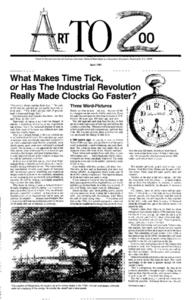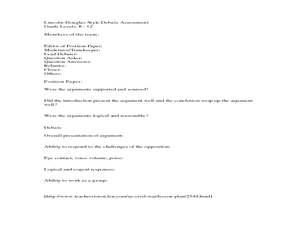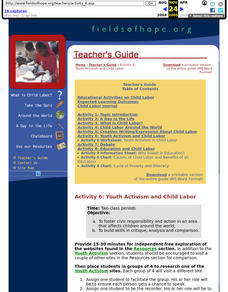Curated OER
Telling Time Timeline
Use the Internet and library resources to compose a telling time timeline -- a visual history of time. Students will develop research skills and gain perspective about telling time by discovering the history of clocks and time.
Curated OER
What Makes Time Tick, or Has the Industrial Revolution Really Made Clocks Go Faster?
Students explore the concept of time both historically and in their own lives. Students count the number of times they refer to a clock and the number of scheduled and unscheduled activities in their lives. Students discuss how the...
Curated OER
Good Timing
Students investigate time, how people measure it, and how it influences our lives. They complete an online Webquest, analyze various calendars, answer discussion questions, and identify references to time in a newspaper article.
Curated OER
Time for All Ages
Fourth graders discover time keeping by analyzing technological advances in history. In this time lesson, 4th graders create and complete a KWL chart based on their research of a famous timekeeping invention, such as a sundial....
Curated OER
Days of the Week
Pupils participate in a variety of center activities to reinforce the concept of days of the week and their succession. The concept of time can also be taught at the same time to introduce timekeeping.
Curated OER
Knowing North: Understanding the Relationship Between Time and The Sun
Students determine how to find North using a watch and their shadow. In this finding North activity, students go outside on a sunny day and work with their shadow and a wrist watch to find out which direction that North is. They examine...
Curated OER
Classroom Lincoln-Douglas Debate
Unfamiliar with the Lincoln-Douglas Debate format? Check out this resource that details the procedures of the debate, the roles and responsibilities of each participant, and the timing of each round.
Curated OER
Turn of the Century: Songs and Events from 1900 to 1920
Students research songs and events from the time period 1900 to 1920. They work in groups to create visual displays of the songs and historical references. At the conclusion of the unit, a concert will be held to perform the songs and...
Curated OER
Teams-Games-Tournaments
Pupils draw cards from a pile and the student that draws the number card gets the first opportunity to answer the question. For example, if a student selects twenty-two from the pile and question twenty-two is, "why is government divided...
Curated OER
Teams-Games-Tournaments
In this lesson, learners play a game in order to understand and review the Delaware civic standards. Student take turns picking cards and the student to pick the first card gets to answer the question. Students are expected to compete...
Curated OER
Freedom's Children
Learners role play a story from from Freedom's Children: Young Civil Rights Activists Tell Their Own Stories. In this segregation activity, young scholars work in a literary circle to create a role play to present to the class. Each...
Curated OER
Gluskap Story Skits
Students read and analyze a Gluskap (Algonquin legend) story. Together, they discuss the morals and values these stories demonstrate and in groups, create and perform an imaginative skit based on one of them. They perform their skits for...
Curated OER
There Is No Place Like Home! U. S. Immigration in the 1800's.
Students explore immigration in the late 1800's. They identify and describe the settlement patterns of European immigrants to the U.S. Students work in groups to research immigration from specified countries.
Curated OER
Astronomer Research
Students discover the contributions of early astronomers and scientists. In this research skills lesson, students research electronic and print sources about Galileo Galilei, Aristarchus, Hipparchus, Claudius Ptolemy, Nicholas...
Curated OER
Freedom Is
Students explore various ideas of freedom by comparing the profiles of seven Mainers from the early 19th century. They discuss freedom and what they think it means to be free. Students complete a Freedom Matrix to explore how seven...
Curated OER
Breaking News English: 2005 was a Second Longer Than Usual
In this English worksheet, learners read "2005 was a Second Longer Than Usual," and then respond to 1 essay, 47 fill in the blank, 7 short answer, 20 matching, and 8 true or false questions about the selection.
Curated OER
What Would You Do? A Discussion About the Ethics of War
Learners examine the process of ethical decision-making during wartime. They read three case studies from World War II, and in small groups discuss, debate, and present their findings to the class.
Curated OER
Youth Activism and Child Labor: Ethics, Work, World Cultures
Students research websites related to Youth Activism (sites are taken from a provided resource list). In different roles, students discuss, summarize and report their findings.
Curated OER
Roll With the Punches: It's Not in Black and White
Students examine history textbooks as to how minorities are depicted when historical events are reported.
Curated OER
Citizens' Power : Deliberative Assemblies
Students study the rule that govern the operations of deliberative assemblies. They explore how they can become respectful citizens who explain Parliamentary government.
Curated OER
Teams-Games-Tournaments
Students review civics standards by playing a game. Each person has a specific role that they are responsible for. They answer questions on topics of leaders, authority, officials, and others.
Curated OER
Teams-Games-Tournaments
Pupils engage in a cooperative learning game to review the civics standards for an upcoming test. There are various game cards with questions on them that each team has to answer. All materials are provided and available for you to print.
National Institute of Standards and Technology (NIST)
Nist Physics Laboratory: A Walk Through Time
An illustrated history of timekeeping from ancient times to the present. Includes information on ancient calendars, early clocks, a revolution in timekeeping, world time scales and time zones, and the NIST standards.
Khan Academy
Khan Academy: Timekeeping
Why do we need calendars and clocks? To survive in this complex society, you need to track what others are doing and when they're doing it. You also need to know what's happening in the natural world. This article discusses how/why...























